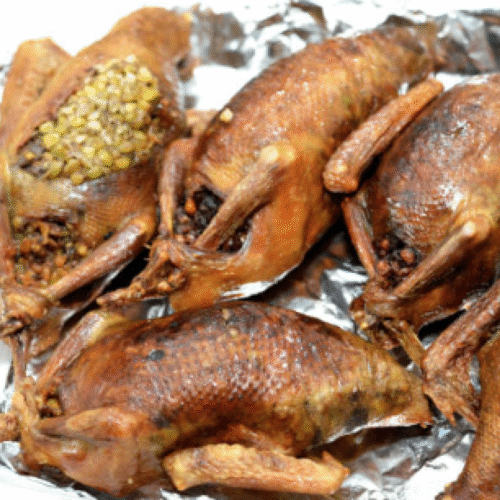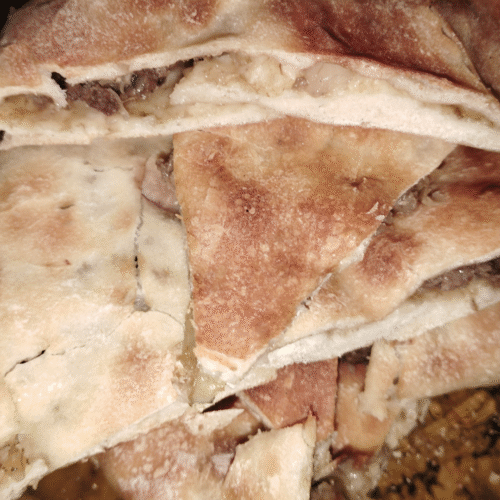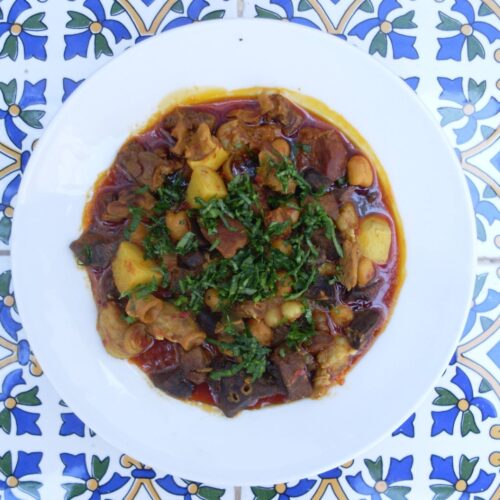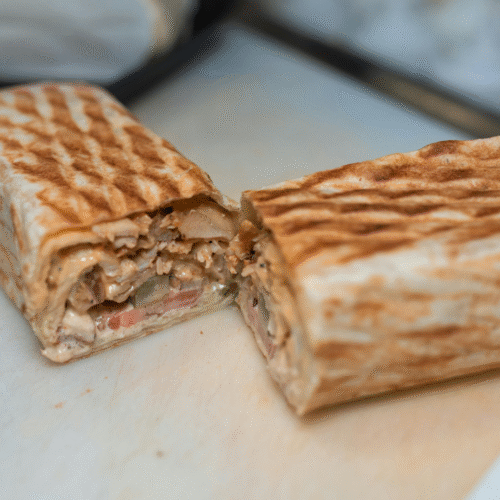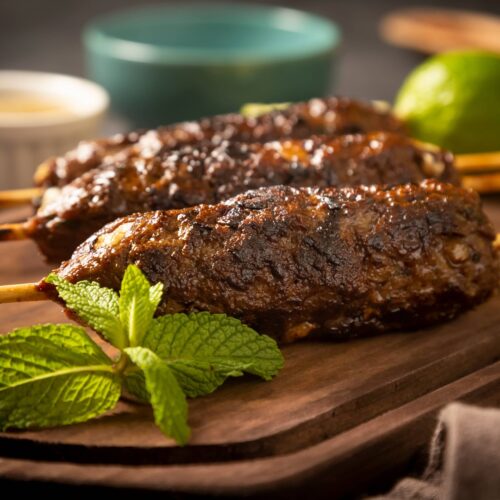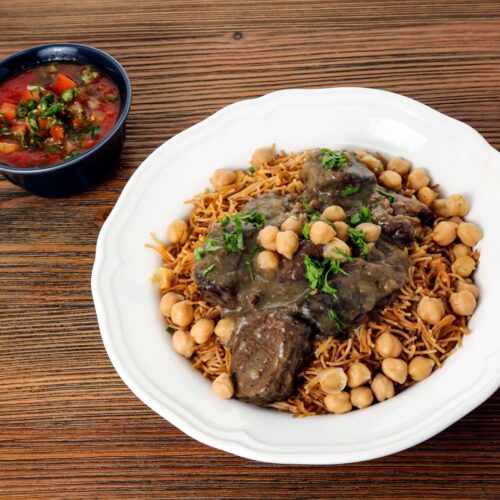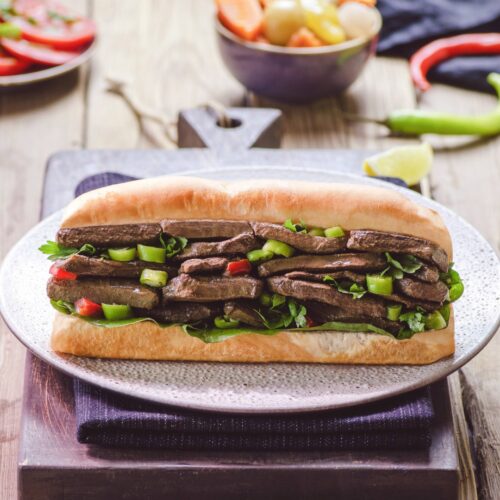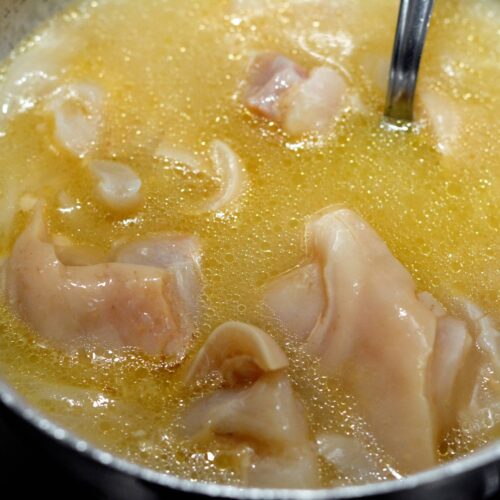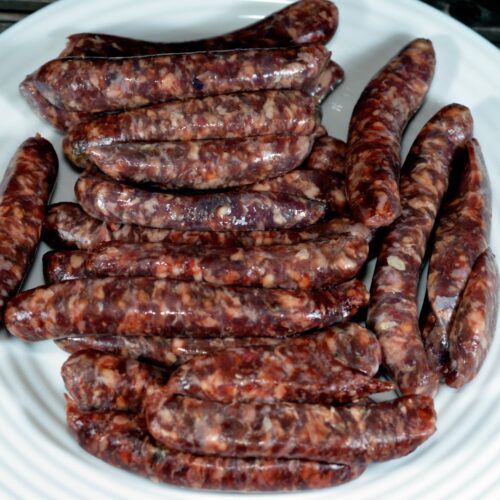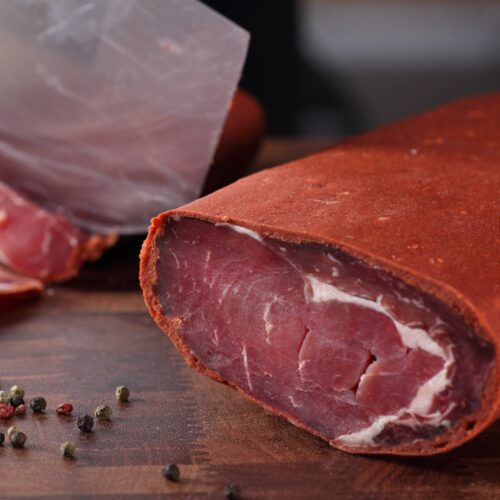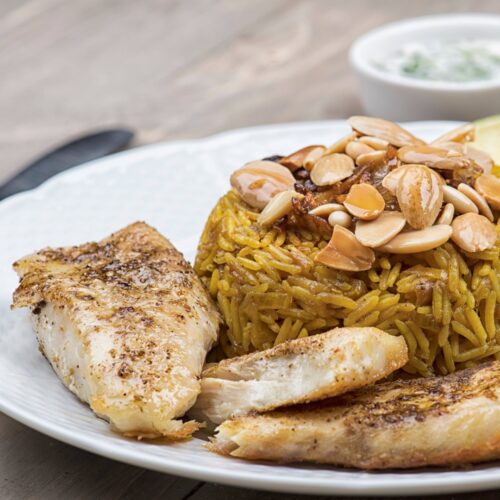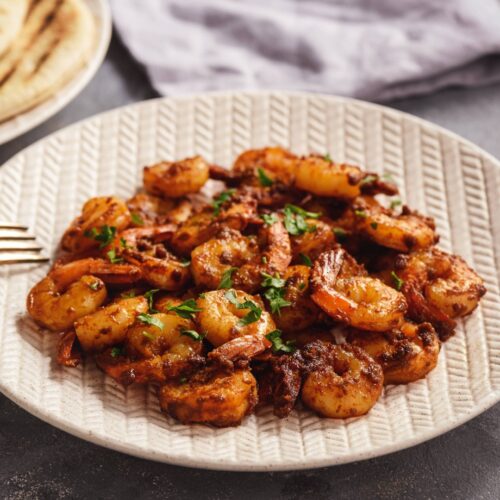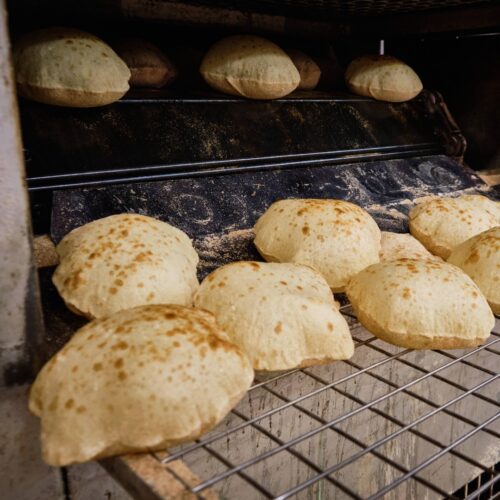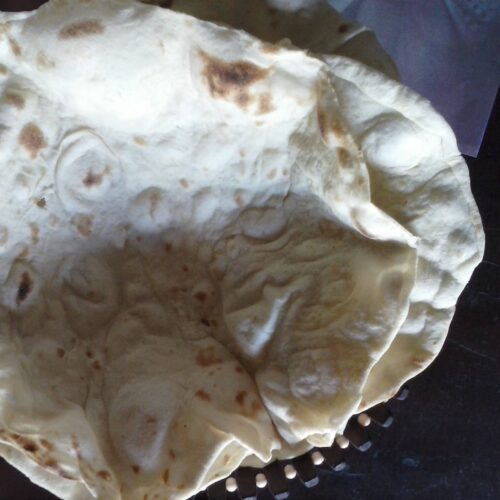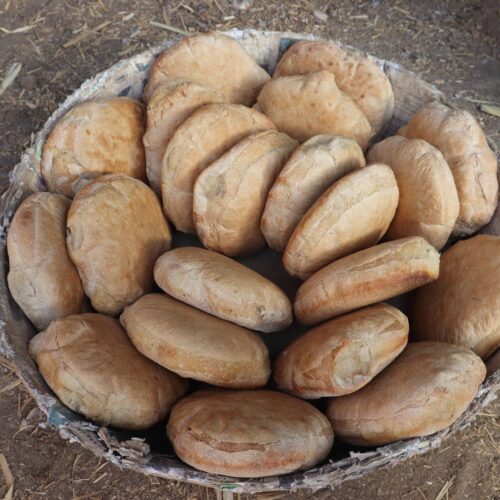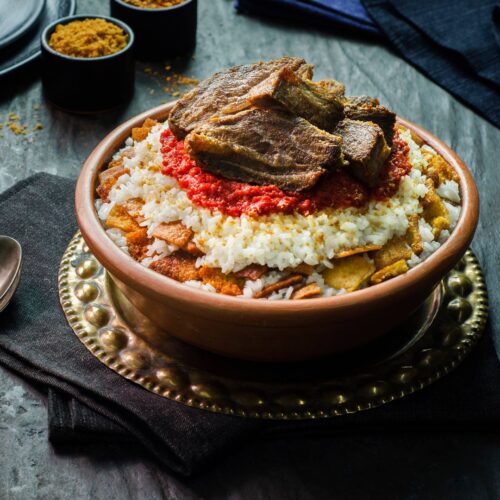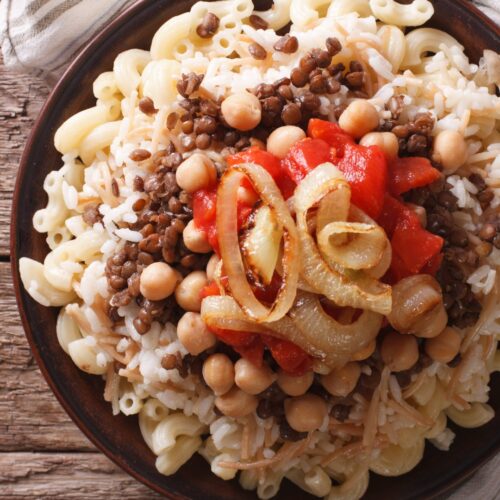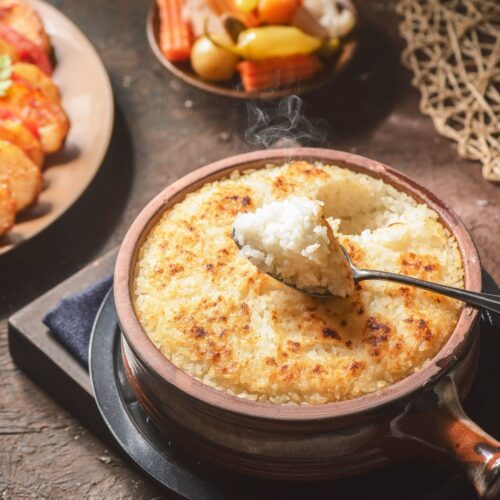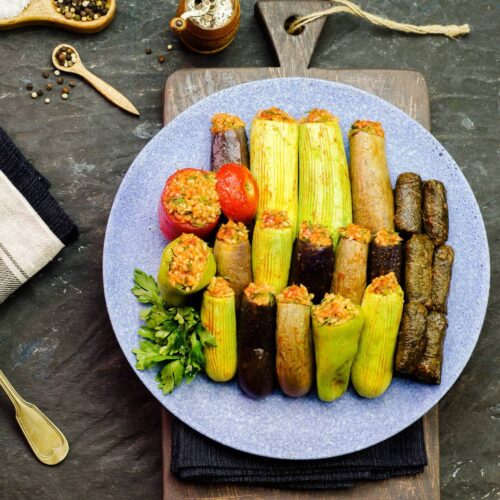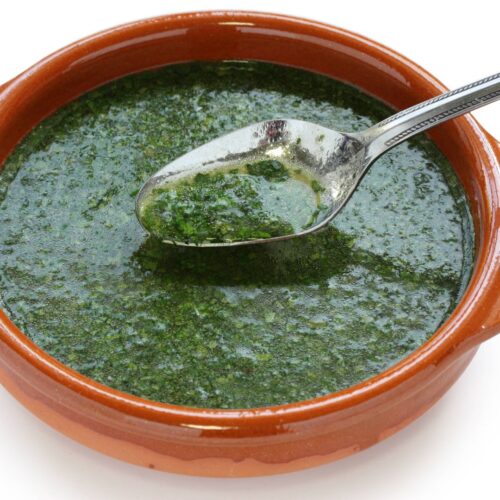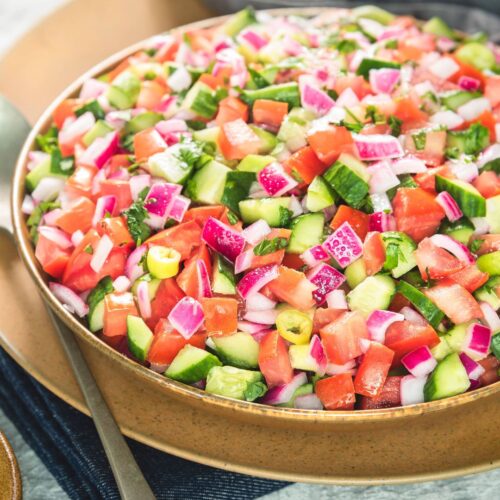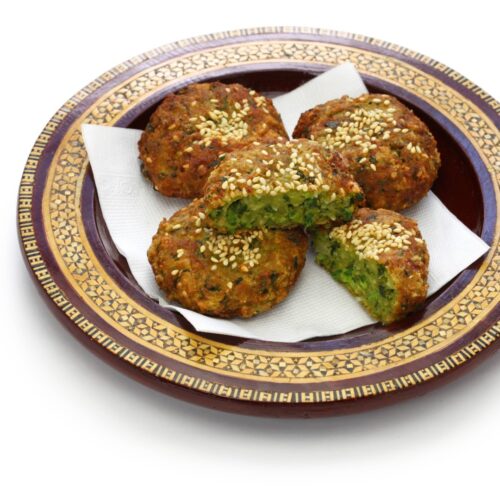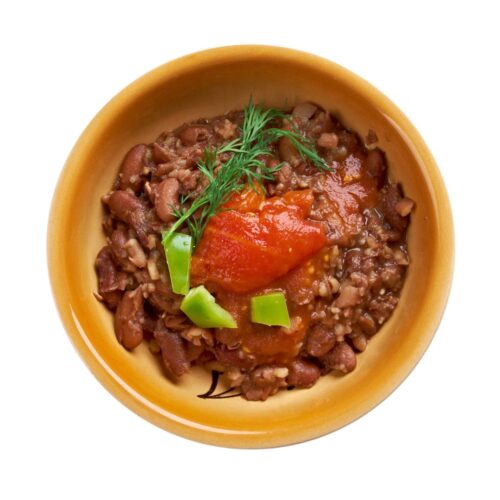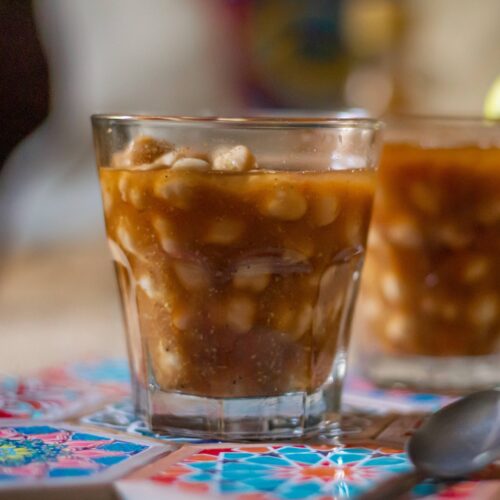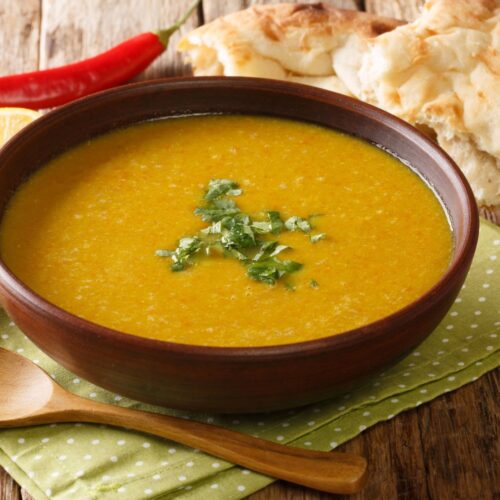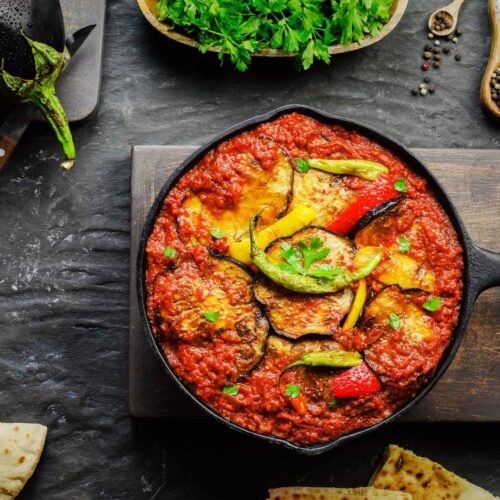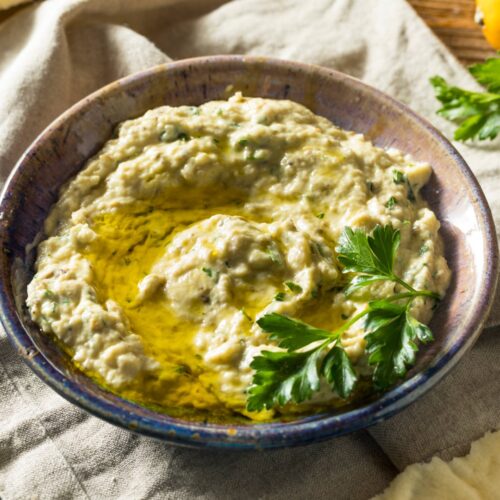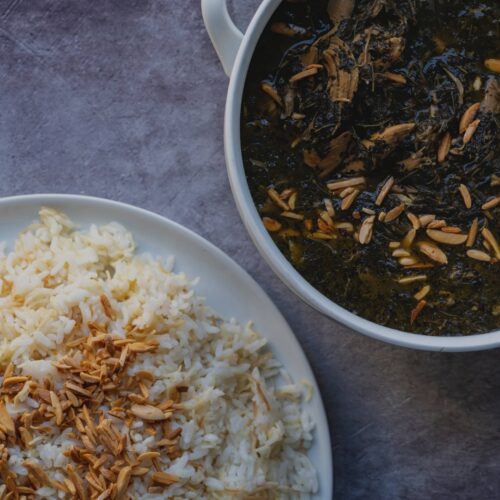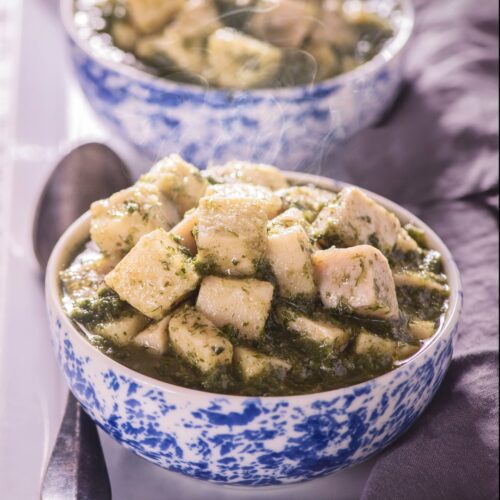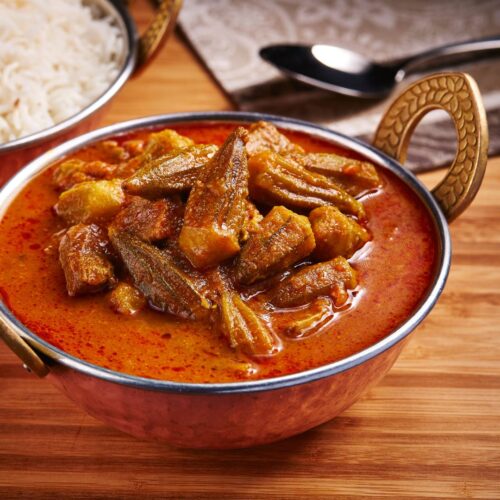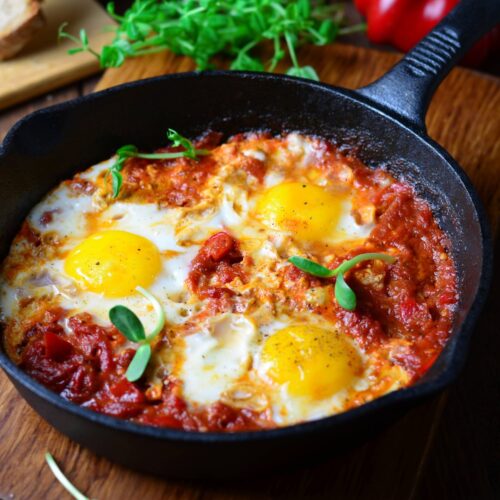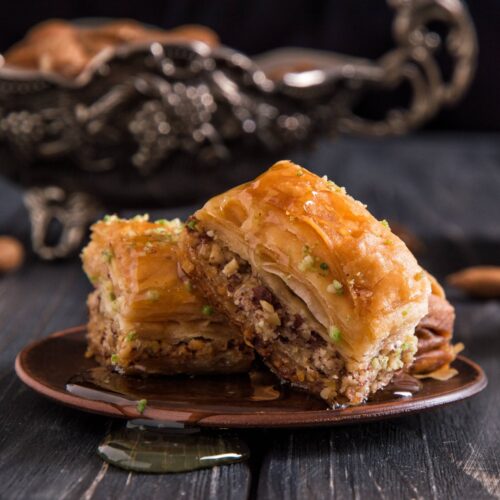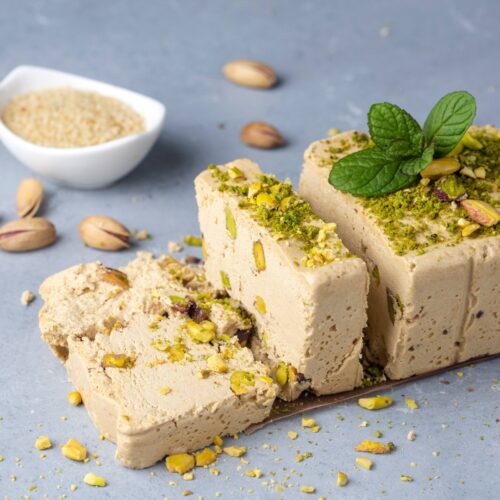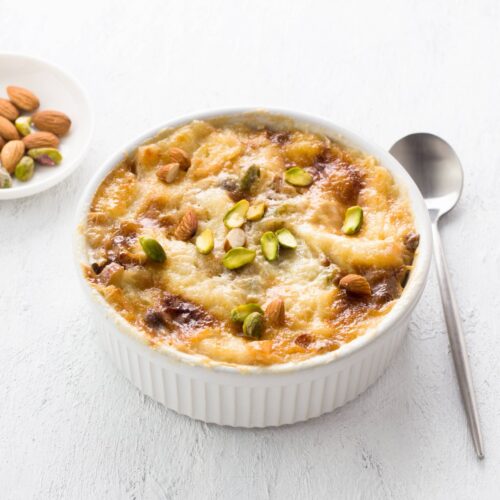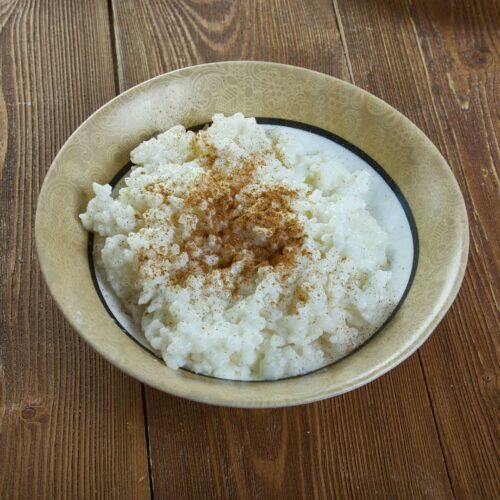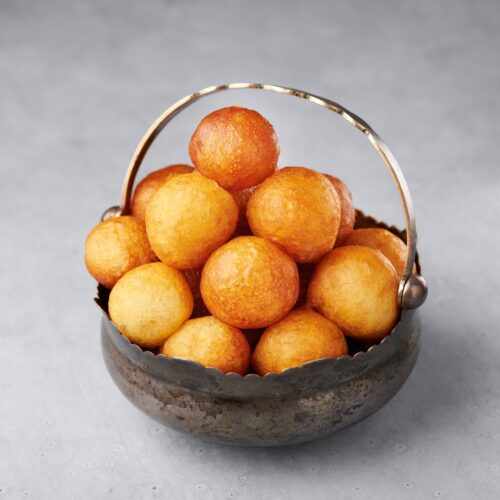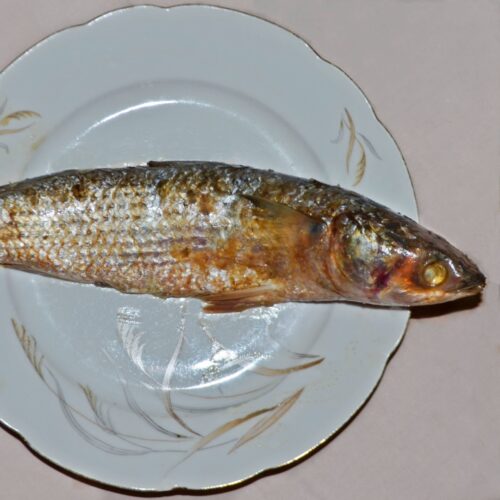THE ESSENCE OF EGYPTIAN CUISINE
Egyptian food is all about grains, veggies, fruits, and legumes – plant-based stuff makes up 84% of what people eat there, putting Egypt (along with Morocco) at the top for plant-heavy diets in the Mediterranean. Since meat’s relatively expensive, it’s mostly used to build flavor in stews and broths, with big chunks saved for special occasions rather than daily meals. The real staples are slow-cooked vegetarian stews served with bread and rice. But in the cities, as populations grow, people are shifting toward quicker, less vegetable-oriented meals; street food has become a go-to option for the urban population, offering cheap, quick bites along the way.
Breakfast on a typical day is small – a hot drink with a piece of bread, ful medames fava bean stew, or falafel, called ta’ameya in Egypt. A more elaborate breakfast includes eggs, fresh and pickled veggies, black honey (sugar cane molasses), and tehina (tahini). If it happens during midday and is consumed at work, lunch is usually an uncooked meal of bread with cheese and beans, tomatoes, leafy greens, and pickles. If eaten at home as the main cooked meal, it would still be based on bread, rice, or pasta, followed by veggie-pulse-tomato stews or hummus. A common approach is to mix pulses with rice and serve with salad.
For people who have their main cooked meal during lunch, dinner tends to be lighter, consisting of what locals call dry foods, meaning without a sauce or leftovers from midday. Evening meals are again dishes of fava beans and lentils, dark leafy greens, pickled vegetables, tomatoes, and cucumbers. A popular summer combination is melon or watermelon, served with white cheese and bread.
Nibbling different snacks and sipping sweet black tea could be called a national habit; coffee is way less popular. In some areas, people rely on super sweet tea as a portion of the caloric intake for workers during the day.
GRAINS IN EGYPTIAN CUISINE
The rich and fertile soil of the Nile Valley provided the Egyptians with cereals and pulses for centuries. Wheat bread is a staple in every meal and is called eish in Egypt. Eish baladi is similar to Levantine pita but made with whole-grain flour. It is more rustic, earthy in flavor, and thicker. Bataw, a leavened countryside flatbread from wheat, barley, or corn, is a popular accompaniment to white cheese. Eish fino is a baguette-shaped roll that is soft inside and is usually cut open for fillings of cheese, halawa (confectionery), or fried liver. Eish shamsi – thick sourdough wheat bread or ‘sun bread,’ deriving from allowing the dough to rise in the sun.
Food eaten with bread can be as simple as a mix of salt, cumin, sesame seeds, an onion, white radish leaves, and some white cheese. Or a complete meal of cooked vegetables or legumes, but bread is still central. Bread is a utensil used to scoop sauce, dips, and stews, as well as to wrap kebabs and falafel.
In very few Mediterranean countries, corn, or maize, is found so profoundly as in Egypt. Native to the Americas and introduced to North Africa by Portuguese traders, it became important in Egyptian diet before the wheat bread subsidizing program was initiated in the 1950s. Still, some rural people make their own bread with maize flour.
Short or medium-grain rice is widely produced and consumed, more so than in any other Mediterranean country. They have more starch compared to long-grain rice and require less water while cooking. Authentic Egyptian rice is tossed with plenty of ghee or butter and mixed with vermicelli noodles and chicken broth. An interesting fact about rice usage in Egypt is that rice is specifically prepared to complement a particular dish. For example, molokhia (veggie soup) is served with plain white rice to balance its rich and garlicky flavor, while sayadeya (a fish dish) is served with yellow turmeric and cumin-spiced rice to enhance the flavors of the fish.
PRODUCE IN EGYPTIAN CUISINE
Pulses have been cultivated in Egypt for thousands of years and remain essential for multiple reasons. Nutritionally, they serve as a protein for many Egyptians. Economically, they provide affordable protein accessible to all social classes. Religiously, they play an important role during Coptic Christian fasting periods. Agriculturally, they are well-suited to the Nile valley’s growing conditions. Egyptians typically cook pulses until very tender, often mashing or pureeing them, and season heavily with garlic, cumin, coriander, and tahini. They’re served with flatbread, pickles, and fresh vegetables.
One of the most ancient Egyptian dishes still eaten today is fava beans ful medames. The recipe for this classic dish has hardly changed since Pharaonic times, when a slowly cooked pot with bean stew was buried in hot embers to cook. Today, it is an Egyptian breakfast staple spread throughout the Middle East, from Sudan to Syria.
Contrary to other Levantine varieties, ta’ameya, also known as Egyptian falafel, is prepared with fava beans, not chickpeas, which are slightly moister on the inside. They are so extremely popular that McDonald’s in Egypt served McFalafel in its breakfast menu. Frugal and nutritious are other famous pulse dishes bissara (split fava beans dip), shurbat ad (lentil soup), hommos el sham (savory beverage made with chickpeas).
Another widely popular street food dish is koshary, which combines pantry staples: pasta, rice, lentils, and chickpeas in one bowl. All ingredients are cooked individually, tossed together, and flavoured with cumin-scented tomato sauce and fried onions. Koshary is a creative example of how combining simple ingredients turns into a uniquely satisfying meal.
Potatoes were introduced to Egypt relatively recently compared to wheat, beans, and lentils. They’ve become well-integrated into modern cooking, but they complement rather than replace traditional starches. Alongside potatoes, Egyptians consume more starchy roots, such as taro root. Taro is believed to be one of the earliest cultivated plants. In Egypt, taro is known as qulqas. After being peeled completely, it is cut into small cubes, cooked in broth with fresh coriander and chard, and served as a side for meat dish.
Egyptian cuisine heavily features vegetables alongside cereals. A common practice of the East Mediterranean and the Middle East is to have them stuffed with spiced rice – mahshi, meaning ‘stuffed’. Another national dish of Egypt is molokhia, which derives its name from a key ingredient, the jute plant, cultivated along the Nile for centuries. It is protein-dense and has high amounts of folic acid. Egyptians believe it has aphrodisiac powers.
The Egyptian version of molokhia is made from fresh or dried chopped leaves boiled in a meaty broth. Separately fried garlic and coriander are added to the soup while still sizzling. Soup is served with white rice, flatbread, pickles, tomato sauce, or vinegar.
Chopped, vinegary fresh salad is a frequent option to balance the richness of other dishes, referred to as salata baladi. Pickles of various vegetables, known as turshi or mekhalel, are served with almost everything. They are super salty, sour, spicy, and have a powerful punch.
MEAT IN EGYPTIAN CUISINE
Quantity-wise, Egyptian dishes do not feature large portions of meat, but rely on it to add richness and flavor. No pork is consumed, but when it comes to animals that are allowed, like beef, lamb and mutton, they are eaten head to toe. Alongside the usual Middle Eastern grilled koftas, kebabs, and shawarmas, there is a variety of offal dishes cooked in endless ways: chopped and grilled, slow-simmered, deep-fried, boiled, and dried. There are dedicated street stalls that sell exclusively offal: chopped liver, brains, and spicy offal-stuffed sausages. The richness and greasiness of these cuts are balanced with fresh veggies or pickles. Not only on the streets, offals also supplement menus in higher-end establishments. At home, cooks can heat a brain in a pot with lemon juice and plant resin to make a boiled delicacy that looks like it’s thinking. The production of foie gras is an old tradition, tracing back to ancient Egyptian tombs, where geese are shown while being fed with figs. To date, it is a well-enjoyed delicacy.
The popularity of poultry has grown significantly since the 1990s, largely due to its affordability, and it is now the most consumed meat. Egyptians are also known for consuming less popular birds, such as ducks and pigeons.
Traces of pigeons used for food date back to Pharaonic times. Today, high needle-like structures made of clay, called pigeon houses, mark the horizon of rural villages – these structures are built for the domesticated pigeons. To make a signature pigeon dish, hamam mahshi, you need a plump, not older than six weeks, squab, marinated, stuffed with rice or freekeh (cracked young green wheat), flavored with onions, cumin, cinnamon, pepper, nuts, and spit-roasted whole. The result is rich and buttery rice and a crispy skin delicacy.
FISH AND SEAFOOD IN EGYPTIAN CUISINE
Fish eating in Egypt depends on the location. People along the coast – around Alexandria, the Mediterranean, and the Red Sea – get to enjoy seafood, Nile Delta, and Valley stick mostly to freshwater fish. If you’re living in the interior or desert areas, you’re probably not eating much fish at all since it’s hard to get fresh and even harder to keep it from spoiling.
Fish are usually cooked whole, rather than the European practice of filleting; they are often bread-coated and grilled or fried, served with rice and vegetables. Fish tagines and stews with tomato sauce, onions, and veggies are also traditional preparations.
MILK AND DAIRY IN EGYPTIAN CUISINE
Milk and dairy plays a secondary role. Milk production requires water resources and suitable climatic conditions for raising dairy cattle. Egypt’s arid climate and water scarcity limit large quantities of milk production domestically, while imported milk is less affordable. Fermented milk products, such as zabadi (yogurt), labneh (strained yogurt product), kishk (yogurt stone), and cheeses, are consumed more.
Evidence of cheese has been found in tombs dating back 3300 years; historians believe it would have had a moist, spreadable consistency. The most prevailing cheese varieties in Egypt are domiati, karish, mish, and roumi cheeses.
Domiati – soft, white, whole cows or buffalo milk cheese, aged for a short period. It’s salty, has a pronounced flavor, and a slightly crumbly texture. Karish is a low-fat, soft, skimmed milk cheese from cows or goat milk with a mild and slightly tangy taste and almost spreadable texture. Mish cheese is a distinctive, extensively fermented, salty and pungent. Its production begins with karish or domiati, which are placed in an earthenware pot and filled to the neck with milk and fenugreek, red pepper, and cumin. Then, the pot is tightly sealed with mud and left to sit for several months to years, allowing it to retain its unique umami flavor. Once eaten, it’s often paired with fresh tomatoes, cucumbers, or bell peppers to balance out the saltiness. Roumi, a hard cheese, has a pungent smell and different degrees of salt depending on age. It belongs to the same family as Italian pecorino romano and Spanish manchego.
NUTS, OILS, AND SWEETS IN EGYPTIAN CUISINE
The Egyptian diet is low in saturated fats, and oil is preferred for cooking rather than butter. Deep-frying has become quite popular. Most vital oils in Egypt are soybean, sunflower and olive oil. Clarified butter, also known as ghee, is essential for many classic recipes.
The Egyptians are not traditionally known for having a sweet tooth – desserts are more associated with feasts and celebrations than everyday. Egyptian sweets share DNA with Turkish, Lebanese, and Syrian desserts. Egyptians stuff their sweets with almonds, hazelnuts, pistachios, dates. Sweets tend to be absolutely drenched in sugar syrup, often more so than their neighbors. Think baklava that’s practically swimming in syrup, or basbousa that’s completely saturated. Rose water and orange blossom waters are used generously; many play with different textures in one bite.
